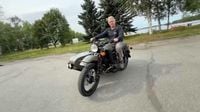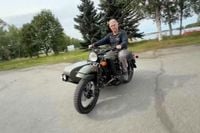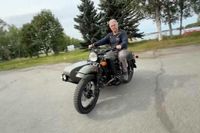It’s not every day that a world leader gifts a motorcycle to a stranger on the streets of Alaska, but that’s exactly what happened last week in Anchorage. During a high-profile summit between Russian President Vladimir Putin and U.S. President Donald Trump, a local man named Mark Warren found himself at the center of an international gesture that’s as surprising as it is symbolic.
The story began, almost unbelievably, by chance. Russian state television Channel 1 reporters were roaming the streets of Anchorage ahead of the summit, when they spotted Warren with his well-worn Ural motorcycle by the roadside. The Ural, a storied brand with roots stretching back to Soviet Russia in 1941, caught the journalists’ attention. They stopped to chat, admiring the vintage machine and striking up a conversation with its owner. According to Reuters, Warren, described as white-haired and bespectacled, explained to the Russian crew that his bike, though beloved, had seen better days. He lamented the struggle to find spare parts, including a new starter, because the manufacturing plant was “located in Ukraine.”
That offhand remark, and the serendipitous meeting, set off a chain of events that would soon bring Warren face-to-face with an unexpected gift. As reported by Russian state media and corroborated by multiple outlets including Reuters and Visordown, the encounter made its way up the Russian delegation’s chain of command. Before long, Putin’s team had reached out to Ural’s headquarters—located, somewhat ironically, in Washington State, USA—and arranged for a brand-new Ural motorcycle and sidecar to be delivered to Warren.
The handover took place in the parking lot of the Anchorage hotel where the Russian delegation was staying. Andrei Ledenev, an employee of the Russian embassy in the United States, presented Warren with the keys. "I have to say that this is a personal gift from the President of the Russian Federation," Ledenev told a clearly astonished Warren, according to Channel 1’s broadcast.
Warren wasted no time taking his new ride for a spin, with Ledenev perched behind him and another man squeezed into the sidecar. Cameras rolled as Warren, still reeling, declared, "It's night and day. I like my old one, but this one is obviously much better." He added, "I'm speechless, it's amazing. Thank you very much." The moment, captured by state television and subsequently circulated by international media, had all the hallmarks of a well-timed public relations coup—but for Warren, it was simply a stroke of good luck.
For those familiar with Ural motorcycles, the story comes with some historical baggage. The brand’s origins trace back to the Soviet era, when the factory was established in 1941 to supply rugged sidecar motorcycles for military use. The company’s name derives from the Ural mountain range in Western Russia. Over the decades, Ural became an icon of Russian engineering, known for its distinctive design and durability. But the intervening years have brought sweeping changes. After the Soviet Union’s collapse, Ural underwent privatization, becoming wholly private after a management buyout in the early 2000s, as detailed by Visordown.
Recent history has added another twist. Following Russia’s invasion of Ukraine—referred to by Putin’s government as a "Special Military Operation"—Ural moved all its production out of Russia. The company now assembles its motorcycles in Kazakhstan, a decision made to avoid the complications and sanctions associated with the ongoing conflict. Ural’s headquarters have long been in Washington State, a detail that adds an extra layer of irony to the notion of a "Russian" bike being gifted on American soil. The company, when contacted by media outlets, did not immediately respond to requests for comment outside U.S. working hours.
As for Warren, the man at the center of this whirlwind, he was reportedly unable to be reached for further comment after the event. But his earlier conversation with Channel 1’s Valentin Bogdanov revealed a pragmatic view. When asked about his part supply woes, Warren explained that the manufacturing plant for his bike’s parts was "located in Ukraine," making it difficult to get the spares he needed. When Bogdanov pressed, "So for you, if they resolve this conflict here in Alaska, I mean Putin and Trump, it will be good?" Warren replied simply, "Yes, it will be good."
The episode, though lighthearted on the surface, is not without its underlying complexities. The intersection of personal fortune, geopolitics, and global manufacturing speaks to the tangled realities of our time. Here was a Russian president, embroiled in a protracted conflict with Ukraine and locked in tense relations with the West, seizing an opportunity to make a grand gesture on American soil. The symbolism was hard to ignore, even as the recipient seemed more focused on his new ride than on international intrigue.
Observers couldn’t help but note the fortuitous timing—and the potential for political theater. Visordown wryly observed that the meeting between Warren and the Russian news crew seemed almost too serendipitous, suggesting that it was "almost like that’s enough to make you forget all the bad things going on in the world, isn’t it?" Whether orchestrated or genuinely random, the event provided a rare moment of levity during a summit otherwise dominated by weightier concerns.
Meanwhile, the story cast a spotlight on the complicated journey of the Ural brand itself. Once a symbol of Soviet might, then a privatized survivor of post-Soviet upheaval, and now a company straddling East and West—Ural’s trajectory mirrors the broader geopolitical shifts of the last century. Its motorcycles, now assembled in Kazakhstan and managed from the United States, are a testament to the ways in which history, commerce, and politics can intersect in the most unexpected places.
For Anchorage, the event was a brief but memorable moment in the international spotlight. For Mark Warren, it was the answer to a practical problem—and a story he’ll likely be telling for years to come. And for everyone watching, it was a reminder that sometimes, the world’s biggest dramas can hinge on the simplest of encounters: a man, his motorcycle, and the unpredictable currents of global politics.
As the dust settles in Anchorage, and the summit’s headlines fade, Warren’s new Ural stands as a curious symbol of diplomacy, luck, and the enduring appeal of a good story—one that, for at least a moment, brought a little wonder to the streets of Alaska.






